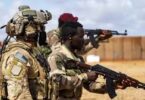Monitoring Desk
KHARTOUM: A growing gap between Sudan’s military rulers and the opposition is complicating the country’s transition to democracy and undermining hopes for stability and a better future among civilians. Sudan has remained in turmoil since April 11, when the military establishment ousted the long-serving President Omar al-Bashir after months of popular protests against his 30-year rule.
The army established a Transitional Military Council (TMC), which has pledged to hold fresh presidential election after a two-year “transitional period”. The TMC has engaged in talks with the opposition-led Freedom and Change Coalition (FCC) about the handover of power to a civilian government, but the talks failed to produce any results. The situation escalated when government forces forcibly dispersed a two-month sit-in calling for the handover of power to a civilian administration in Khartoum, killing more than 100 protestors.
The opposition responded by staging a nationwide “civil disobedience” campaign to pile pressure on the military rulers to hand over power to civilians. The TMC hit back by cancelling all previous agreements with the opposition and suspending all talks with them. “We were happy to hear that the two sides were close to sign an agreement,” Adul Hafiz Aljak, 45, a trader, told Anadolu Agency.
He said the collapse of talks between the two sides has nipped in the bud his hopes for stability and economic prosperity. “We have been promised to enjoy stability and democracy in Sudan,” he lamented. “So far, we can’t see any of these hopes materialized.” “Don’t forget that the Sudanese are suffering from economic hardships and they want to change the government and see stability and economic prosperity,” he said. The African Union (AU) has suspended Sudan’s membership until the country’s military rulers hand over power to a transitional, civilian-led administration.
The pan-African body also dispatched Ethiopian Prime Minister Abiy Ahmed to mediate between the TMC and opposition in Sudan. After the Ethiopian mediation, the Sudanese opposition suspended its civil disobedience campaign, while the TMC freed all political detainees. The moves, however, failed to restore trust between the two sides.
“The TMC has intentionally handled the situation in a way to purchase time and reorganize itself,” MazinAlamin, 24, a university student, told Anadolu Agency. “The opposition coalition, meanwhile, used wrong tactics in the negotiations,” he said. “They principally accepted the sharing of power with the military, which is a big mistake.” Yassmin Ahmed, 34, an engineer, blamed the military for the current deadlock. “The FCC represents the revolution forces,” she said. She argued that the opposition Sudanese Professional Association (SPA), which spearheaded protests against al-Bashir’s rule, was supposed to take over power, along with a limited military representation in the government. “That was a reasonable formula to guarantee a safe transition to democracy in Sudan,” she opined. (AA)






